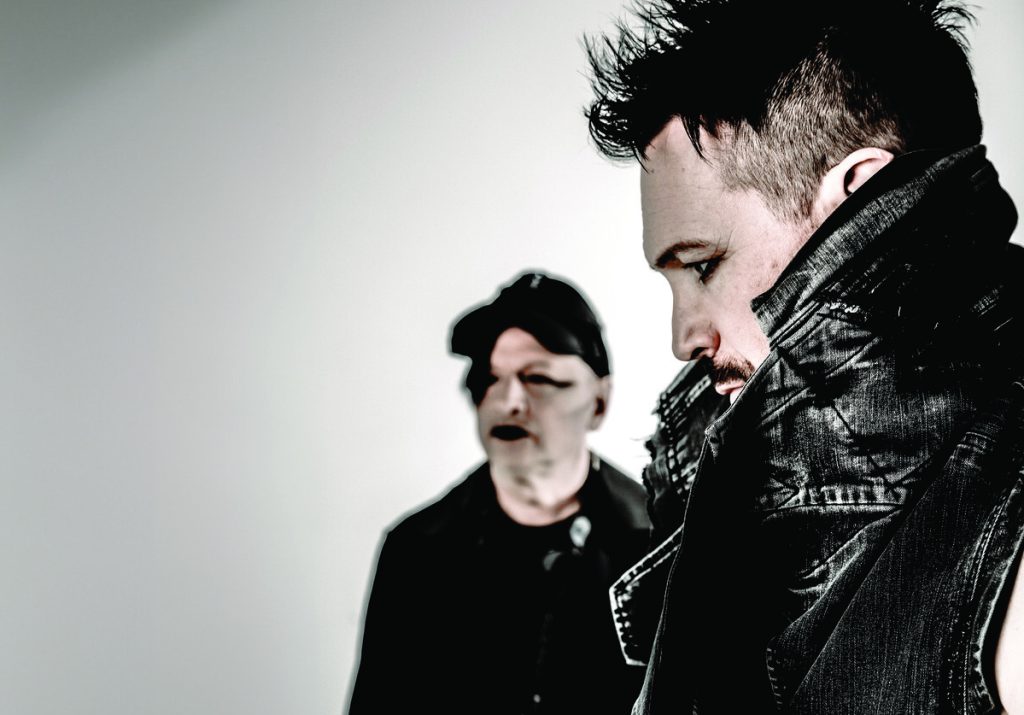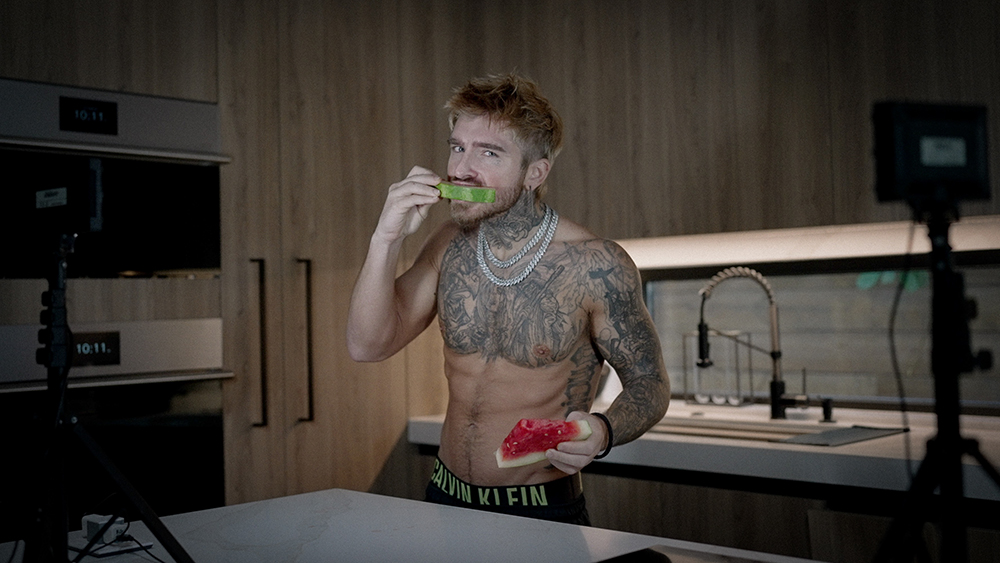SUBSCRIBE to Barcroft TV: http://bit.ly/Oc61Hj A CAUCASIAN man has spent over £75000 on surgeries to look like his Korean …
Source from https://www.youtube.com/watch?v=f_MgAeIkGTQ
Defying Convention – InkedMag
Rising from the ashes like a gloriously leather-clad phoenix drenched in black eyeliner and glittery nail polish, JULIEN-K remains a testament to innovation and reinvention within the music industry. Originating from the remnants of the renowned band Orgy, JULIEN-K embodies the visionary artistry of Ryan Shuck and Amir Derakh, two relentless explorers of the creative frontier. In an exclusive interview, Shuck provides insights into the band’s origins, the transformative journey, and the ongoing project Dark Mode.

The inception of JULIEN-K traces back to the slow-burning eventual dissolution of the mid- to late-90s metal band Orgy, pointing to it as the very moment that prompted Shuck and his collaborators to embark on a journey of self-discovery and musical evolution. “JULIEN-K emerged organically from the ashes of Orgy as we sought to redefine our artistic identity,” Shuck recounts. This period of transition catalyzed the band’s growth, shaping its uniquely distinct aesthetic and sound.
Reflecting on JULIEN-K’s musical trajectory, Shuck emphasizes the band’s commitment to defying conventions and exploring uncharted musical territories. “We aimed to fuse the dark, brooding atmospheres of Depeche Mode with the raw energy of guitar-driven rock,” he explains. This innovative fusion became the cornerstone of JULIEN-K’s signature style, proudly distinguishing itself in the fast-paced nature of the constantly evolving music industry.
The burgeoning band’s early days took an unexpected turn with a fortuitous collaboration with SEGA for the Sonic the Hedgehog video game soundtrack. Ultimately, Shuck was thrust into the spotlight as the lead vocalist for JULIEN-K. “It was a pivotal moment that propelled JULIEN-K into a new realm of visibility and creative exploration,” Shuck recalls. Embracing his role as the frontman, Shuck and the band members expanded their lyrical horizons, garnering acclaim and accolades along the way, and developing somewhat of a die-hard fanbase.
JULIEN-K’s musical contributions beyond the stage didn’t just stop with everyone’s favorite little blue hedgehog in high tops. The band’s unique sound shines through prominently on soundtracks for Michael Bay’s global billion-dollar “Transformers” franchise and myriad independent films. Shuck attributes the band’s early successes to a mere willingness to embrace diversification and adaptability. “We’ve always been drawn to projects that push boundaries and challenge the status quo,” he says.

In challenging that status quo, one aspect of JULIEN-K’s curated identity that resonates deeply with fans is the band members’ affinity for tattoos, which Shuck describes as a form of self-expression and rebellion. “Tattoos have always been a significant part of our aesthetic and identity,” the frontman says, explaining how his tattoo collection is like capturing moments in time forever. “They serve as a visual representation of our journey and our commitment to authenticity.”
Dark Mode is the band’s current focus alongside finishing out its highly anticipated tour. The ambitious project represents a departure from previous work. Dark Mode is an auditory exploration of the shadows; a journey into the depths of the human psyche,” Shuck claims. Funded through a successful Indiegogo campaign, Dark Mode demonstrates JULIEN-K’s evolution and its willingness to embrace change, embodying a darker, more electro-punk feel and bringing less lyrically charged offerings to the table for eager fans to dive headfirst into.
Shuck delves into the creative process behind Dark Mode, describing it as a collaborative effort fueled by experimentation and introspection. “We wanted to challenge ourselves and our audience to push the boundaries of electronic music,” he explains. The result is a sonic array that seamlessly blends darkness with pulsating dance beats, defying genre classification and captivating listeners with its raw emotion and energy.

While reflecting on JULIEN-K’s status as an outlier in the music industry, Shuck asserts, “We’ve always marched to the beat of our own drum, refusing to be confined by genre labels or industry norms.” Despite this, Shuck remains dedicated to JULIEN-K’s devoted fanbase, stressing the importance of authenticity and genuine connection.
Much of JULIEN-K’s loyal fanbase can be attributed to the fact that the band members are extremely hands-on when interacting with listeners, often recognizing familiar faces in a crowd, and personally handling community outreach endeavors themselves. JULIEN-K’s dedication to its fans is a rarity in today’s music industry and something that should be applauded.

Shuck elaborates on the challenges of growing in the music industry, highlighting the importance of perseverance and resilience in the face of adversity. “The music industry can be unforgiving at times, but we’ve learned to embrace the journey and remain true to ourselves,” he reflects. Through dedication and determination, Julien-K carved out a niche for itself, earning respect and admiration from peers and fans alike.
The saga of JULIEN-K epitomizes resilience and innovation from within the too-often rigid confines of the music industry. With Dark Mode lighting the way and a fervent following in tow, JULIEN-K continues to push boundaries and challenge norms, solidifying its legacy as a vanguard of electronic evolution. Through their music, tattoos, and unwavering commitment to rebellious authenticity, JULIEN-K’s bandmates stand as forces to be reckoned with in the world of electro-death-pop, inspiring countless others to embrace creativity and chart their own path in the pursuit of artistic excellence.
Unraveling the Tapestry of Able Heart
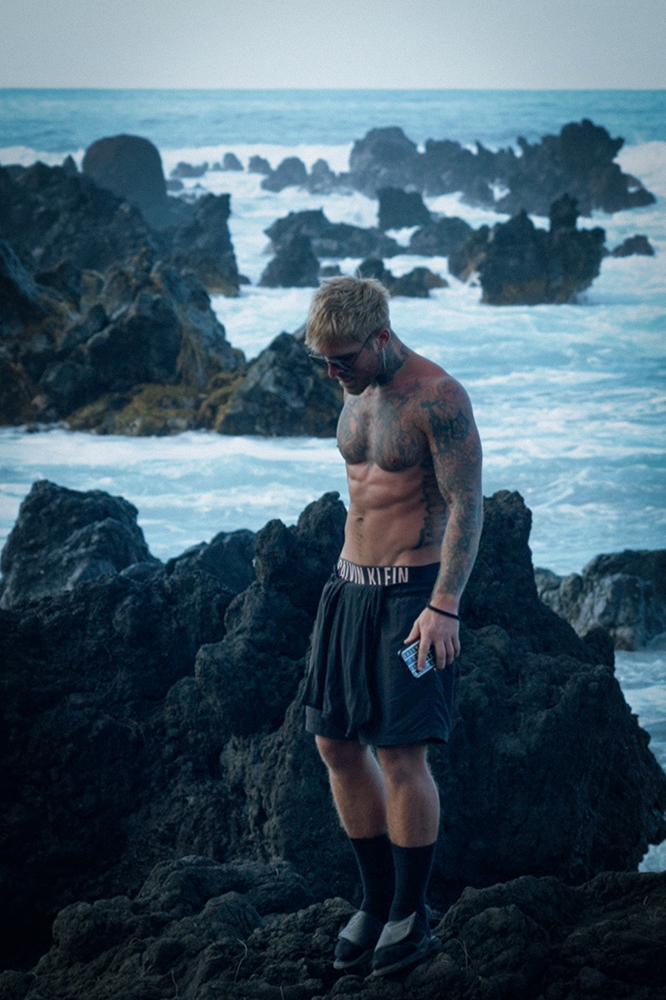
“There’s a full spectrum to my music,” Able Heart begins, his voice a mirror to the depth and diversity of his sound. “It started way darker, a lot of things that I went through in life,” he admits, hinting at a past marked by struggles and silence, now vocalized through his art. This spectrum isn’t confined to his music alone; it’s vividly illustrated in the living canvas of his skin.
“I’m blasting over old tattoos,” he shares, a metaphor for his life’s journey. “It’s kind of like my music,” he muses, “You evolve, and your art evolves with you.” His tattoos, once markers of a darker time, are now overlaid with images that reflect the man he’s become: a phoenix rising from the ashes of his past.
His mother’s influence, a constant beacon of support, is immortalized in ink on his skin. “My mom’s lips here,” he points to a seemingly fading tattoo on his forearm, “She always said, ‘You’re able to do anything your heart desires.’ That’s where ‘Able Heart’ comes from.” It’s not just a name; it’s a philosophy, a salute to the limitless potential within each of us.
The transition from a world-class snowboarder to a musician wasn’t without its scars — both physical and emotional. “I used to ride with a company that helped support people that couldn’t pay to travel and go to competitions,” he recounts, a nod to the community that once uplifted him, now mirrored in the Full of Heart Fam group he’s fostering through his music and online presence. The glimmer in his eyes as he speaks about his community only echoes how important the outreach to his fans truly is.
His continued commitment to his fans also comes through in a unique (but also seemingly popular) way. In discussing his virtual concerts, Able Heart’s enthusiasm is palpable. “They’re unique… intimate,” he says, his eyes lighting up. “It’s all about connecting with people, even if it’s through a screen.” This sense of connection, of reaching out and touching lives across the digital divide, is what drives him. “Music is the best funnel… for people listening and being able to resonate with things,” he explains.
Yet, it’s not just about the music or the tattoos; it’s about the journey — his relentless pursuit of happiness, his unwavering belief in the power of manifestation, and his dedication to helping others realize they’re not alone in their struggles. “I care about other people in the sense that, if they see something, I want them to also know that they’re able to do anything their heart desires,” he says, his voice earnest, his message clear.
Able Heart’s tattoos do more than decorate his skin — they tell his story, a narrative of overcoming, evolving, and embracing every facet of his being. From the sonic depths of his darkest hours to the vibrant beats of his brightest moments, his life is a testament to the power of resilience.
As we trace the contours of his tattoos, we’re not just observing art; we’re reading chapters of a living, breathing autobiography, one where every line, every note, and every cover sings of a heart that’s truly able.
Singing for the Misfits – InkedMag
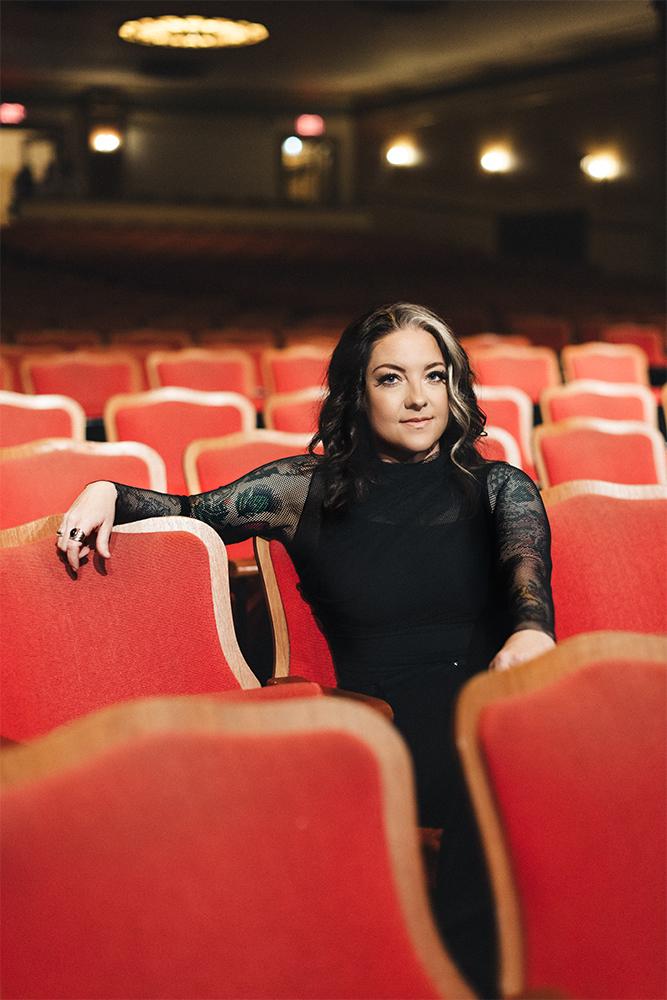
We’re all looking for somewhere to belong. It’s human nature: we need connection, community, and belonging to maintain our well-being. In a world where authenticity can sometimes feel elusive, Ashley McBryde is the lighthouse we’re all searching for. Through her vocals, raw storytelling, and direct actions, she champions the importance of belonging and community, fostering connections that transcend beyond the music industry.
McBryde is one of the most acclaimed country artists to emerge within the past few years. She received six Grammy Awards nominations with one win, one Country Music Awards (CMA) trophy, three Academy of Country Music (ACM) awards, and one nomination for a Daytime Emmy. With success like that, it’s easy to enter a self-obsessed bubble. But McBryde is still badass and a true girl’s girl. She sets the record straight: “I know it can seem like women in country music are catty. We are not. We want you here. We party together. Come on over.”
Growing up as the youngest of six kids, music was always part of McBryde’s life. “I’ve been singing since I was old enough to know that they were throwing shoes at me trying to get me to shut up,” she jokes. With influences like Dolly Parton, Patty Loveless, and Trisha Yearwood, McBryde was surrounded by powerhouse female artists who shaped her musical journey.
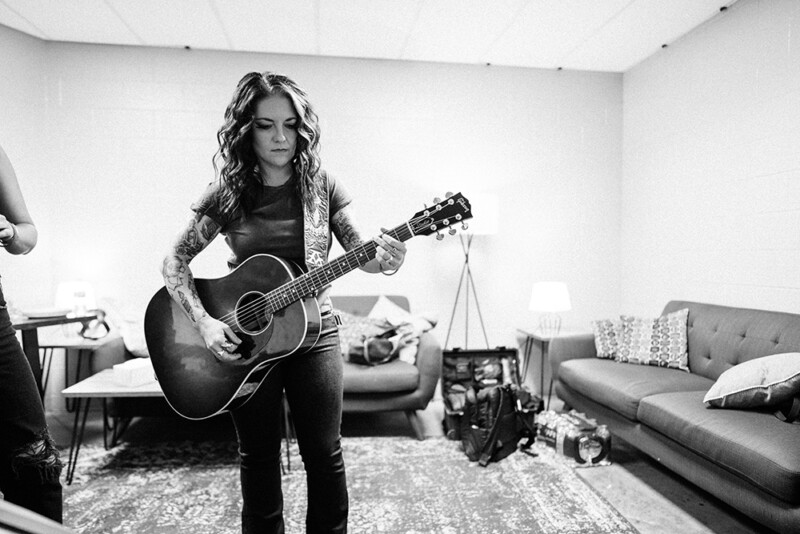
McBryde found belonging in music, in storytelling, and with audiences. “I remember when I was little, I was really shy and I didn’t want to talk to people, but I could sing to them,” she reflects. Music has served as a gateway to human connection for McBryde. Before embarking on her world tour, McBryde spent some of 2023 touring with Jelly Roll, CMA’s New Artist of the Year. “When we got on tour, he said to me, ‘You’ll never feel more at home anywhere than you will on my tour.’ This rang true for his audience, especially being someone who’s covered in tattoos in country music, where being tall and blond and pristine is standard. And I’m short and brunette and covered in tattoos.”
McBryde wants to return that sense of belonging to her audience — to every person. “I want people in active addiction in my crowd. I want people in recovery in my crowd. These are the people that will stick to the devil they know. These are the guys and girls going nowhere. They’ve been told this. They’ve been told they’re pieces of shit by their teachers, their coworkers, their spouses in some cases, and their parents. That’s who I want to sing to.”
When talking about performing her song “6th of October,” McBryde says, “When we sing, ‘Reckless hearts, the tattered and bruised ones, the slightly confused ones, the ones holding stools down in bars, will show up and find us and gently remind us to not be afraid of our scars and who we are.’ That is my favorite thing to watch. When the audience closes their eyes and turn their head to the side and sing ‘slightly confused ones,’ they are in that moment admitting that’s them or recognizing that’s somebody close to them. And that’s a gift that we can’t just give on our own. That’s only through the power of song and live performance that we can offer them just a couple milliseconds of peace.”
McBryde doesn’t just sing to her audience — she commits to deeply connecting with them, even if they cannot hear her voice. She recently began signing lyrics and phrases on stage. After surgery on her vocal cords, she couldn’t speak for weeks, so McBryde learned enough American Sign Language for necessities, like water and food. “I’m still learning, and sometimes slowly,” she says. “But it just became more and more apparent to me that one: I needed to learn more. And then I remembered we’ve got interpreters. And I thought it would be even cooler if I could thank the interpreters myself. And even better, can I thank my non-hearing and hard-of-hearing crowd? Because they’re there, or there wouldn’t be an interpreter. I want to thank them myself and say things like, ‘We see you, we’re happy you’re here, it’s nice to meet you, welcome to my show.’”
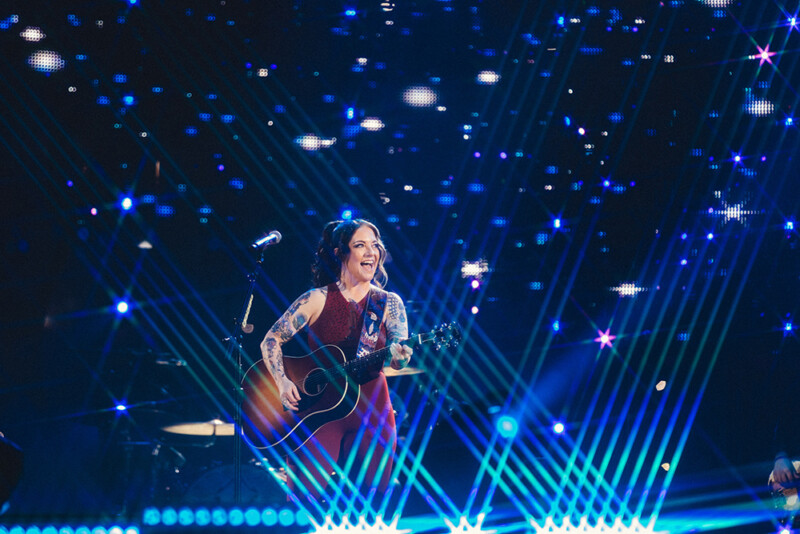
She was right — they were there. “The first reaction that really moved me was a lady at a show who said, ‘My sister is 62 years old and has been deaf her entire life and has been invisible her entire life. And you make me feel like she can be seen right now.’” It’s clear McBryde is committed to creating a community of inclusivity and belonging, and this is just one example.
On the inside of her left elbow is a tattoo of a devil staring into a rearview mirror, inspired by her latest album “The Devil I Know.” The album is filled with tender emotions, tough revelations, and the message of staying true to yourself, even when it’s not so pretty. “That’s the devil I know for sure,” she says. “And this really reminds me of my song ‘Blackout Betty,’ and one of the lines that is ‘I’m a real piece of shit sometimes.’ That’s not necessarily gorgeous, but it is true. And it doesn’t have to be pretty to be true. So, I know that bitch is still in the back seat, and she is ready to take over at any time.”
That fiendish passenger may still be in the back seat, but McBryde wouldn’t change a thing. “If I could go back and make it easier on younger me, her skin wouldn’t be as thick, and she wouldn’t be as strong as I get to be now.” It’s that mix of tough exterior, authenticity, and deep connection with audiences that keeps fans returning to the main stage.
I Have 6 Girlfriends & Men Hate Me | LOVE DON'T JUDGE
SUBSCRIBE to Truly: http://bit.ly/Oc61Hj FOR LX Xander, one girlfriend just isn’t enough. The music producer currently has six …
Source from https://www.youtube.com/watch?v=vbYmjp9C6Fk
Digital Age Dynamo – InkedMag
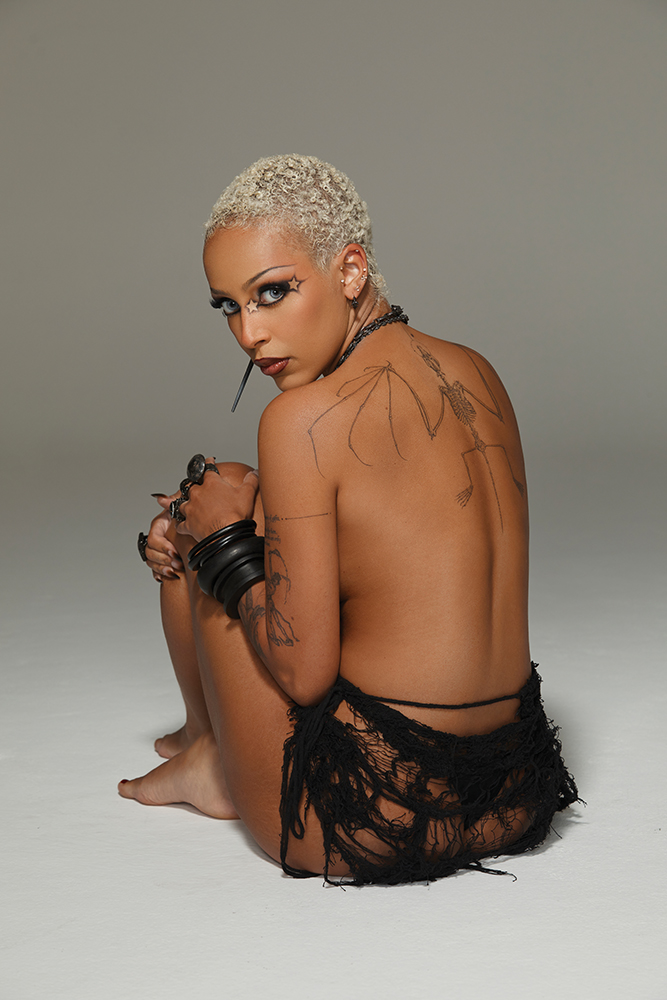
In the ever-evolving music industry universe, there are those rare talents that completely transcend boundaries. These days, artists who can utterly captivate audiences with their raw talent, creativity, and unapologetic individuality are few and far between. Doja Cat, born Amala Ratna Zandile Dlamini, is a shining example of such a rare character.
Breaking through the surface of the music industry, a product ushered in purely by the digital age, the Grammy Award-winning superstar planted her roots firmly in the SoundCloud scene before headlining an international arena tour. The tattoo-clad icon’s rise to global stardom is nothing short of extraordinary, indicative of her pure and unflinching star power.
Born and raised in the vibrant cultural hub of Los Angeles, Doja Cat’s upbringing was steeped in a rich pool of musical influences. With a childhood that found the star lost in the eclectic sounds of artists like Busta Rhymes, Erykah Badu, and Nicki Minaj, coupled with an enthralling passion for piano, Doja’s love of music and innate talent ignited a spark that would set the world on fire. These early influences laid the groundwork for pop-focused rap which the star finds herself consistently breaking records in today.
At 16 years old, Doja Cat made her mark on the music scene in 2013 with her first upload to SoundCloud, a platform that served as the launching pad for her historic rise to fame. From there, it wasn’t long before the star’s undeniable talent caught the attention of industry insiders, leading to a pivotal moment in 2014 when she officially signed with Kemosabe/RCA Records, setting the stage for her rapid ascent to stardom.
The release of her EP “Purrr!” and debut album “Amala” paved the way for Doja Cat’s burgeoning career, but it was her August 2018 single “MOOO!” that catapulted her into the mainstream consciousness. With its infectious beat and irreverent charm, “MOOO!” captured the attention of fans worldwide, earning critical acclaim and labeling Doja Cat as a rising star to watch.
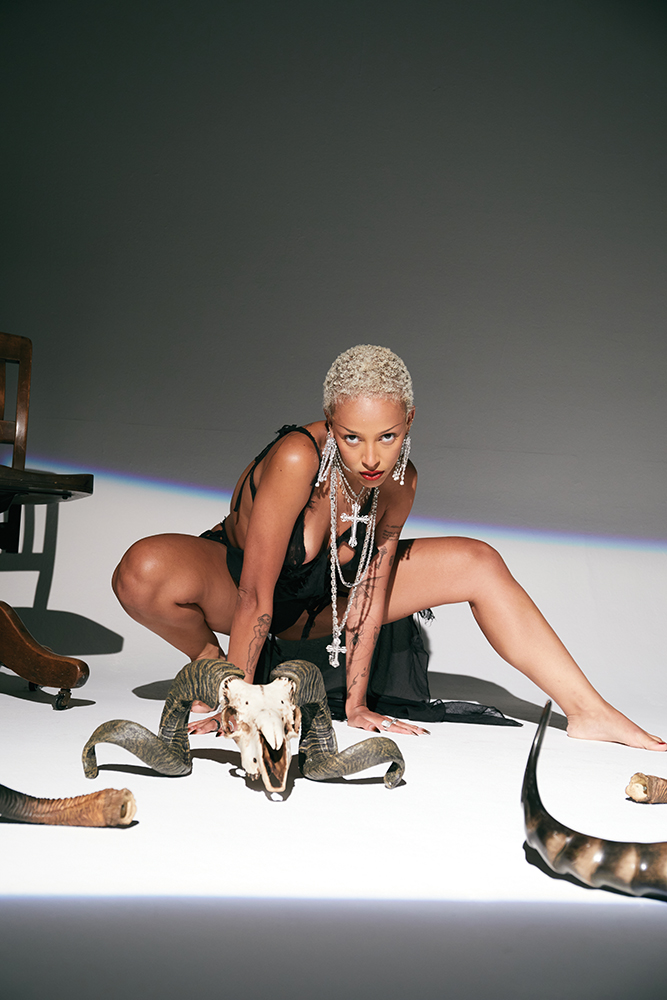
Her sophomore album, “Hot Pink,” released in November 2019, further solidified her position as a musical powerhouse. Boasting more than 6 billion streams worldwide, the album showcased Doja Cat’s versatility as an artist, with hits like “Streets,” the soundtrack behind the viral Tik Tok Silhouette Challenge that blew up on everyone’s FYP during the COVID lockdown, and the Grammy-nominated “Say So” drawing in audiences and critics alike in record-breaking numbers.
In June 2021, Doja Cat released her Grammy Award-winning album “Planet Her,” a tour de force of creativity and innovation. Dominating the charts and generating a historic number of streams on Spotify, “Planet Her” is what solidified Doja Cat as a global superstar. Collaborations with fellow artists like SZA on the multi-platinum hit “Kiss Me More” further elevated her continuous influence and widespread appeal.
The release of her fourth and most recent studio album, “Scarlet,” in September 2023 marked yet another milestone in Doja Cat’s illustrious career. Featuring the smash hit single “Paint the Town Red,” which made history by becoming the first rap song to top the Billboard 200 chart since August 2022.
“Scarlet” showcased Doja Cat’s evolution as an artist and solidified her reputation as a trailblazer in the industry. A complete shift from her previous public persona, “Scarlet” is a horror-infused era for Doja. Shifting away from the divine femininity that simply oozes from “Planet Her,” “Scarlet” showcases the scarier side of the star. Once again, captivating the masses and maintaining a steady hold over pop culture and the A-list music industry she’s had for the better part of a decade.
Doja’s impact extends beyond music, as the pop culture icon recently brought tattoos to the forefront of the fashion and beauty industry during the 2024 Grammy Awards. Styled by Turkish-British designer, Dilara Findikoglu, the singer found herself gloriously drenched from head to toe in faux tattoos that peeked out beneath a sheer floor-length gown. This iconic look became arguably the most discussed appearance of the night, with Doja Cat garnering immediate praise for her boldness and individuality, further highlighting her fearless approach to self-expression. The highly decorated star continues to push boundaries and challenge the status quo, on and off the runway.
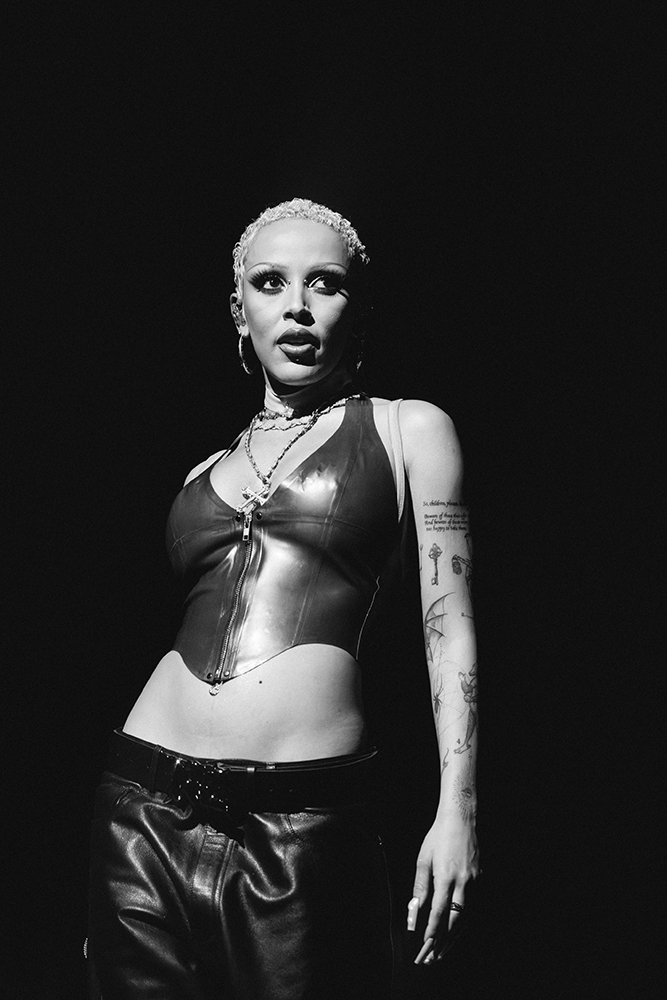
In 2024, Doja Cat shows no signs of slowing down. Recently treating fans to two electrifying singles: “n.h.i.e.” with British rapper 21 Savage and a feature on “Jeezu” with the multi-faceted artist Jeymes “The Bullitts” Samuel. Lending her production capabilities to the latter, “Jeezu” was featured in Samuel’s most recent cinematic foray, “The Book of Clarence” released in January 2024. These collaborations underscore her versatility as an artist and her unwavering commitment to pushing the boundaries of her craft.
Perhaps the most exciting news is the recent announcement of the U.K. and European dates for the Scarlet Tour 2024. Kicking off in June, Doja will grace the stages of iconic venues in cities such as London, Paris, and Amsterdam. And before embarking on her European adventure, she’ll captivate audiences at Coachella in April, solidifying her standing as one of the most sought-after performers in the world.
As Doja Cat prepares for this new chapter of her journey, her dedication to her craft and her fearless approach to self-expression continue to inspire fans and fellow artists alike. With each step, she reaffirms her status as a true visionary in the world of music, leaving a scarlet mark on the hearts and minds of all who have the pleasure of experiencing her artistry firsthand.
Singing for the Misfits – InkedMag

We’re all looking for somewhere to belong. It’s human nature: we need connection, community, and belonging to maintain our well-being. In a world where authenticity can sometimes feel elusive, Ashley McBryde is the lighthouse we’re all searching for. Through her vocals, raw storytelling, and direct actions, she champions the importance of belonging and community, fostering connections that transcend beyond the music industry.
McBryde is one of the most acclaimed country artists to emerge within the past few years. She received six Grammy Awards nominations with one win, one Country Music Awards (CMA) trophy, three Academy of Country Music (ACM) awards, and one nomination for a Daytime Emmy. With success like that, it’s easy to enter a self-obsessed bubble. But McBryde is still badass and a true girl’s girl. She sets the record straight: “I know it can seem like women in country music are catty. We are not. We want you here. We party together. Come on over.”
Growing up as the youngest of six kids, music was always part of McBryde’s life. “I’ve been singing since I was old enough to know that they were throwing shoes at me trying to get me to shut up,” she jokes. With influences like Dolly Parton, Patty Loveless, and Trisha Yearwood, McBryde was surrounded by powerhouse female artists who shaped her musical journey.

McBryde found belonging in music, in storytelling, and with audiences. “I remember when I was little, I was really shy and I didn’t want to talk to people, but I could sing to them,” she reflects. Music has served as a gateway to human connection for McBryde. Before embarking on her world tour, McBryde spent some of 2023 touring with Jelly Roll, CMA’s New Artist of the Year. “When we got on tour, he said to me, ‘You’ll never feel more at home anywhere than you will on my tour.’ This rang true for his audience, especially being someone who’s covered in tattoos in country music, where being tall and blond and pristine is standard. And I’m short and brunette and covered in tattoos.”
McBryde wants to return that sense of belonging to her audience — to every person. “I want people in active addiction in my crowd. I want people in recovery in my crowd. These are the people that will stick to the devil they know. These are the guys and girls going nowhere. They’ve been told this. They’ve been told they’re pieces of shit by their teachers, their coworkers, their spouses in some cases, and their parents. That’s who I want to sing to.”
When talking about performing her song “6th of October,” McBryde says, “When we sing, ‘Reckless hearts, the tattered and bruised ones, the slightly confused ones, the ones holding stools down in bars, will show up and find us and gently remind us to not be afraid of our scars and who we are.’ That is my favorite thing to watch. When the audience closes their eyes and turn their head to the side and sing ‘slightly confused ones,’ they are in that moment admitting that’s them or recognizing that’s somebody close to them. And that’s a gift that we can’t just give on our own. That’s only through the power of song and live performance that we can offer them just a couple milliseconds of peace.”
McBryde doesn’t just sing to her audience — she commits to deeply connecting with them, even if they cannot hear her voice. She recently began signing lyrics and phrases on stage. After surgery on her vocal cords, she couldn’t speak for weeks, so McBryde learned enough American Sign Language for necessities, like water and food. “I’m still learning, and sometimes slowly,” she says. “But it just became more and more apparent to me that one: I needed to learn more. And then I remembered we’ve got interpreters. And I thought it would be even cooler if I could thank the interpreters myself. And even better, can I thank my non-hearing and hard-of-hearing crowd? Because they’re there, or there wouldn’t be an interpreter. I want to thank them myself and say things like, ‘We see you, we’re happy you’re here, it’s nice to meet you, welcome to my show.’”

She was right — they were there. “The first reaction that really moved me was a lady at a show who said, ‘My sister is 62 years old and has been deaf her entire life and has been invisible her entire life. And you make me feel like she can be seen right now.’” It’s clear McBryde is committed to creating a community of inclusivity and belonging, and this is just one example.
On the inside of her left elbow is a tattoo of a devil staring into a rearview mirror, inspired by her latest album “The Devil I Know.” The album is filled with tender emotions, tough revelations, and the message of staying true to yourself, even when it’s not so pretty. “That’s the devil I know for sure,” she says. “And this really reminds me of my song ‘Blackout Betty,’ and one of the lines that is ‘I’m a real piece of shit sometimes.’ That’s not necessarily gorgeous, but it is true. And it doesn’t have to be pretty to be true. So, I know that bitch is still in the back seat, and she is ready to take over at any time.”
That fiendish passenger may still be in the back seat, but McBryde wouldn’t change a thing. “If I could go back and make it easier on younger me, her skin wouldn’t be as thick, and she wouldn’t be as strong as I get to be now.” It’s that mix of tough exterior, authenticity, and deep connection with audiences that keeps fans returning to the main stage.
Haters Say I'm Cardi B From Wish.Com | HOOKED ON THE LOOK
SUBSCRIBE to Truly: http://bit.ly/Oc61Hj DEZZY RENEE went viral in 2021 for her resemblance to the American Rapper Cardi B.
Source from https://www.youtube.com/watch?v=50b705bzOuk
Everything You Missed at the When We Were Young Music Festival 2023
Thousands of music fans stepped back in time to the exhilarating days of the ’90s at the When We Were Young music festival in Las Vegas. Over the weekend of October 21-22, the festival grounds were filled with roughly 70,000 enthusiastic fans, all ready to relive the golden era of punk-inspired tunes. Despite the unusually hot October weather, with temperatures reaching an unrelenting 90 degrees, the nights brought cool breezes that added to the magical atmosphere.
The energy was electric as fans eagerly awaited performances from iconic 90s bands such as Green Day, Blink-182, and Sum 41, among many others. The festival grounds were a sight to behold, with a multitude of food stands, bars, and relaxing spots equipped with misting systems to help festival-goers beat the heat. It was a true haven where fans could unwind, connect with fellow music lovers, and revel in the incredible performances for a remarkable two-day extravaganza across four stages.

The success and smooth execution of the When We Were Young festival is nothing short of extraordinary. To entertain and cater to such a massive crowd without any major incidents is a testament to the organizers’ meticulous planning and dedication. In a city known for its big celebrations, this festival has undoubtedly left its mark as an unforgettable event.
When We Were Young brought together a lineup of prominent and fresh-faced cross-genre bands, each offering an unforgettable performance that left the crowd in awe. From surprise collaborations to wild stage antics, the event was a true spectacle of music and entertainment.
There were so many stand out performances that we can’t list them all here, but here are a few highlights.
Yellowcard took the stage by storm, celebrating the 20th anniversary of their iconic album “Ocean Avenue.” But that wasn’t the only surprise they had in store for their fans. Singer/songwriter Cassadee Pope made a special appearance, joining the band to sing their hit song “Only One.” The crowd erupted with excitement, savoring the unique rendition. Not to be outdone, Pierce the Veil delivered an emotionally charged performance, highlighted by a heartwarming gesture. During their performance of “Hold on Till May,” the lead vocalist brought a lucky fan onstage and gifted her his guitar. It was a touching moment that confirmed the band’s connection with their audience.

Good Charlotte returned to the stage after a five-year hiatus, and they made sure to make it a weekend to remember. In an unexpected twist, on Sunday night’s performance they brought out the legendary rapper Lil Wayne, who delivered an electrifying performance of “A Milli” and “Lifestyles of the Rich and Famous.” The collaboration was a fusion of genres that had the crowd in a frenzy.

Simple Plan brought the element of surprise to a whole new level. Not only did they showcase their own high-energy performance, but they also invited special guests on stage. Members from Plain White T’s, Bowling for Soup, and MXPX bands joined forces with Simple Plan while their lead singer, Pierre, showed off his drumming skills. The stage was transformed into a collaborative hub, leaving fans with a medley of cover songs, including “All Star,” “Sk8r Boy,” and “Mr. Brightside.”
When it comes to stage antics, Blink-182 never disappoints. Travis Barker took his performance to new heights, quite literally. His drum set floated on risers during “Miss You”, captivating the audience. And to top it all off, the band concluded their set with a grand display of fireworks, illuminating the night sky and leaving the crowd in awe.
Green Day brought their signature energy to the festival. Before even starting their set, a bunny-suited hype man wearing a black tee with a red tie worked fans into a playful spirit. Their opening song, “American Idiot,” set the tone for an electrifying set. Throughout their performance, they commanded the audience to put their hands in the air, clap, and jump, creating an infectious energy that reverberated throughout the fesrival grounds.

WWWY 2023 was a testament to the power of live music and to the love of retro bands, offering an array of unforgettable moments. From surprise collaborations to awe-inspiring stage antics, each band brought their unique flair. It was a celebration of music that united fans and artists alike, leaving everyone with memories that will last a lifetime.
Where Do We Go From Here, ASTN?
We sat down with the up-and-coming Los Angeles based R&B singer songwriter, ASTN, to discuss heartbreak, tattoos, Pokémon, and the creative process.
While the Florida-grown artist is an undeniable hitmaker, the “Happier Than Ever” singer’s latest album, “Where Do We Go From Here,” has been a tonal departure from his usual sound. The album encapsulates the rollercoaster-esque aftermath of a breakup featuring haunting lyricism and a few songs anyone could get down to in the club.

Let’s jump right into it. Can you just tell me a little bit about how “Where Do We Go From Here” all came together?
Yeah, totally. So the first track on the project’s called “How Soon,” and that was the jumping off point. I wrote that last year in March. I had just gone through a three year relationship, and then we both ended up going our separate ways. So, it had been a while since I had felt those types of feelings of confusion and being lost. It was like a sense of freedom as well, like it’s all this giant roller coaster. The first song to come from that was “How Soon,” and when I wrote that, I didn’t realize I was riding a project. I was just kind of getting stuff off my chest.
Similarly, with the outro of the project, “Starlight.” I think it made sense for them to be the bookends as they were the first to come from the project, it felt like all the bottled up emotion I had from my previous experience kind of went into those two songs. Everything in between, kind of just filled the gaps. Where Do We Go From Here? is kind of like an eight track project about my year and the experience of moving on, having a good time looking back, wondering where it went wrong, analyzing the relationship, and learning from it. I feel like the project has a lot of questions in it and I’m not sure if there are any answers.
Do you usually approach things knowing it’s gonna be a full project?
I don’t think so. I don’t think I’ve ever been a big-picture kind of person. I think I will just write however I feel in the moment. Obviously, during the last year and a half of writing this project, I’ve written so many more songs than just the eight featured. Like I said, the first two songs, “How Soon” and “Starlight” were the two points where I was like, okay I’m starting to build something here.
Down the line, I would love to be able to put something together conceptually. Before any lyrics are written, I would love to be able to sit down with all my collaborators and come up with the idea, and then put everything to music. I feel like that’s where really, really, really good bodies of work are made. This project was just getting stuff off my chest and it felt like it was necessary for it to happen the way it did.
How did you balance that necessity while working with people?
I think one of the beauties of songwriting is, it’s almost like a version of therapy a little bit. Obviously, it’s not intentional therapy where you’re going there for a specific reason, but it’s funny, some of these songs, the more vulnerable ones, were written with people that I was meeting for the first time. I think whenever you go into the studio with someone as a songwriter, you are ready to hear whatever they have to say, or you’re just open and willing to go in whatever direction they want. Especially if you’re a songwriter working with an artist, you’re kind of just going there like, “how are you feeling today?” blah, blah, blah. You just take it all in and try to regurgitate what they say in the form of a song. It’s just something I really appreciate about really good songwriters and this project is filled with them. They, they just really know how to put your mess of a brain and your consciousness into a song. That’s what I’ve been doing for a while too. I wrote a lot of my own stuff, but I feel like the beauty of this project was that it feels so personal. However, it has a, a big sense of relatability. And I think that comes from the collaboration part of it being okay. It’s not just my experience, but it’s also that this project is moving the songwriters too.
How much do you consider how fans will react or, whether or not it will be marketable when you’re writing personal songs?
Whenever it comes to songwriting, I feel you’re intentionally trying to write something that is relatable. I feel like people do this all the time trying to make whatever a “hit” is nowadays while also trying to make something everyone can relate to. I feel like a lot of people, even me as a listener, love when people are super, super, super specific about their situation. If it rings a bell with you at any time and it’s specific, it hits even harder. Also, I don’t think someone listening to your music has to relate to the entire song, but if it’s one little detail that reminds them of something, I feel like that’s all it takes. So, as an artist, you owe it to yourself to make something that’s true to you. If your situation is very specific and you wanna talk about that, I feel like you owe that to yourself.
Your single “Element” is a little different for you. Can you tell us a little about that song in particular?
I took my first trip to Miami, and I’d never been to Miami before. I feel like maybe that’s where the song came from, me being in a different space with a different collaborator. I got to work with Poo Bear down in Miami, which was a super good time. It was great to be in the studio with him. I feel like I learned so much just as a songwriter and a creative. His work ethic is so good, it’s really inspiring. We wrote two songs on that trip, “Element” and “On Schedule.” I don’t really make a lot of music like that, but “Element” is more like club, uptempo, high energy. I’m usually more mid tempo, laid back, chiller, but I felt like it was necessary to have this on the project. I’m glad Poo Bear brought it to my attention that he wanted to do something like this. It really makes the project feel like a rollercoaster ride, kind of like a breakup. I feel like the project does that with “Element” being what it is. That’s why I love this project so much. All of the collaborators on it really pushed me to come up with new sounds and to use my voice in different ways while challenging me lyrically. I think “Element” is a big highlight of that atmosphere.

I want to go back to the very beginning, what got you into music?
My dad was a drummer growing up. When I was three or four he bought me a little drum set and I was just like, poking holes in it, having a good time. I think he could kind of tell that I had something going on musically. When middle school came around, I ended up joining the school band, and I went on to do drumline in high school. That was my baby at the time, especially in high school. We moved around a lot. So I didn’t really attach to friend groups that often. I didn’t really see any sense in making friends if I thought I was going to move soon. Instead, I really grabbed onto music and, and took it seriously.
In high school, around my sophomore or junior year, I started producing in a Florida studio. It was just me and my buddy messing around one night, making dubstep music, which was insane. That’s where I started, as a producer. Then, towards the beginning of college I ended up getting a mic and an interface. No one wanted to record all my beats, so I taught myself to sing between 2016 and 2017 and then started recording covers, learning how to record my vocals through trial and error. That’s when I kind of broke into R&B music, I was also studying jazz in college at the time. I feel like Jazz and R & B have a relationship going on. So, I started releasing music secretly without my parents knowing and one day they found it and they were gassing me up about it which felt great. My parents loved it so much, and that was when the light came on for me, I was like, wait, maybe I can do this as an artist, you know?
So we have to talk about tattoos, what was the first one? Does it still exist, or have you had it removed?
Yes, it still exists. My song “Flowers”, released in 2018, was my first song to hit a million plays, and I wanted a tattoo significant to that moment in my life. It’s funny, I feel like a lot of people go through this, but you start with tattoos that mean something or have a big significance in your life and as you go, you kind of start filling up your body with nonsense.
That first one, how did you feel when you got it?
It’s cool because it’s like a time capsule, you know what I mean? I can remember exactly where I was when I got that. I remember where I was in my life. A million plays is still awesome to me now, but back then, it was such a massive deal. It’s almost like a reminder to just enjoy the journey. It’s about the little milestones you hit along the way. It acts as a solid reminder not to take anything for granted.
You mentioned the journey of not taking tattoos so seriously anymore, was it a slow process or did it start after that you started getting silly stuff?
It was definitely slow. Me and my sister got some matching tattoos, so I have those. Honestly, after that it kind of took off. I have a couple Pokémon on my arm. I have a sword, some anime eyes, a skeleton, an eight bit eyeball, and none of that really means anything to me. I love Pokémon, but it doesn’t have a massive significance in my life. It’s pretty funny having those few significant tattoos surrounded by chaos.
Have you seen any fans with tattoos?
I’ve seen someone put my lyrics on them or, I have this hand tattoo that I’ve seen a few of my fans get, which is super cool. I’ve seen one person do it on their hand, but usually they’ll do it on their arm or their leg. Part of me feels like a parent where I’m like, “why would you do that?” I’m just getting whatever, like I said on my arm, I don’t really care. Whenever I see fans with tattoos of my music, I’m like, “why would you even think about doing that?” Then I have to remind myself, they’re the same as me; they don’t really care.
Which tattoos are your favorite?
I have a Pokémon Emerald cartridge on my arm. It’s this big, green block. I love it because I’ve never seen anybody with it before, I’m sure it’s been done, but I’ve never seen anybody with it even on the internet. This big old Pokémon cartridge is the first one I ever got when I moved to Los Angeles, and ever since my tattoo artist did that one in LA I was like, you’re my guy for life.

Who is your guy for life?
His name is Chris, @electricink09 on Instagram.
What are the plans going forward? Are you touring, doing shows, working on a new project? What is your next move?
I have a ton of music, and I’m still writing new music. That’s my favorite part of the process. It would be sad if I ever stopped writing. I’m also doing some one-off shows right now, trying to just pop around and continue performing. I’m also working on building a live set as well. I would love to tour soon and get on the road and see different places. I think that’ll be a big part of me and my journey. Probably late fall or early spring would be ideal for a few shows here and there. So I think that’s next on the horizon, and while the next project hasn’t started yet, I have a few ideas cooking.



